- Home
- Allan Topol
Russian Resurgence Page 8
Russian Resurgence Read online
Page 8
“In 1944 Stalin, claiming that the Chechens were collaborating with the Germans, ordered the deportation of the entire population of Chechnya—half a million people—to Kazakhstan. They remained there until Khrushchev let them return home.”
“Even for the Russians that was pretty extreme,” Craig remarked.
“It shows what the Russians think of the Chechens,” Gideon explained. “The Russians named the capital of Chechnya “Grozny,” which means “terrible” in Russian, more confirmation of how the Russians regarded the region. This brings us to Omar. He was a young professor of European history in Grozny in 1994, when the first of the two modern Chechen wars with Russia began. When the Soviet Union disintegrated in 1991 and entities in the former USSR like Georgia, Uzbekistan, and Ukraine were declaring independence and freedom from Russian dominion, the Chechens said, ‘We want our freedom, too.’ This was too much for Moscow. The Russians said ‘nyet’ and sent troops to enforce their will.
“Omar became the leader of one of the nationalist groups pressing for independence. His group wasn’t militant—in fact, it eschewed violence and wanted to negotiate with Moscow. That didn’t matter to Kuznov, who was the highest ranking intelligence officer accompanying the Russian troops that rolled into Grozny. Kuznov’s theory was that if he lowered the boom on the peaceful secessionists, it would break the back of the independence movement. So he sent troops to Omar’s house one night. Omar was chained to a pillar and forced to watch while they gang-raped and murdered his wife, then tortured and killed his two young daughters. Kuznov decided to leave Omar alive to tell the grim tale, expecting it would have a chilling effect on the independence movement. But that was a big mistake.”
Gideon paused, choosing his words carefully. “Omar was well liked by the Chechens,” he continued. “This barbaric act intensified their opposition to Russia. It also drove the history professor into the arms of the militants and jihadists who gave him training and turned him loose to conduct hit-and-run operations against the Russians, including an attempt on Kuznov’s life in Grozny. This attempt would have succeeded had Kuznov not changed cars at the last minute in the motorcade. A powerful bomb, arranged by Omar, completely destroyed the car Kuznov was supposed to have been riding in.
“Kuznov responded by ordering a ruthless and relentless campaign in Grozny. It lasted two years and killed tens of thousands of civilians, leaving the city in ruins. The independence movement and opposition to Russia disintegrated in the city—or what was left of it. Grozny had been suppressed. The war was over.”
“What happened to Omar after that?” Craig asked.
“He went underground. In 1999 the Russians launched the Second Chechen War in an effort to squelch the embers of the independence movement and the growing threat of radical Islam. Omar carried out hit-and-run operations against Russian troops in the mountains of the Caucasus.
“When that war ended, he returned to Grozny. The city had been rebuilt into a modern city with glass skyscrapers. Kuznov had installed Daud Mollah to be the despotic ruler of Chechnya and its capital Grozny, with complete subservience to Moscow.
“Omar was well hidden by supporters. According to a Russian defector who immigrated to Israel, Kuznov and Omar reached an understanding: Omar would not carry out any attacks in Russia, including Chechnya, and Kuznov would not try to kill him. It was a strange deal that both sides recognized might not hold, but it was the only agreement they could reach to stop the mutual bloodshed, at least for a while. Periodically, Omar ventured out of Chechnya and conducted attacks against Russian troops in foreign countries including Crimea and Syria.”
“But there aren’t any Russian troops in Paris,” Craig pointed out.
“That’s what worried us. Our assumption is that another jihadist group with assets in France has recruited Omar to conduct an operation for them in Paris, hoping to capitalize on the fact that he’s not on French intelligence’s radar.”
“What would Omar gain from it?”
“Money to finance attacks against Russians. Some of those jihadist organizations are loaded with cash.”
“So your assessment is that Amos stumbled across a terrorist operation being planned by a Chechen terrorist in France, and that he paid for it with his life.”
“All of the facts point to that conclusion.”
“You should know, Craig,” Moshe interjected, “that as soon as I learned that Omar was the terrorist Amos had uncovered in Paris, I asked Amos to come home because I knew how vicious the man could be. I told Amos we would pass the information along to Jean-Claude, and they could deal with it. Amos strongly resisted, telling me that he wanted to find out what Omar was planning and that he thought he was close. He wanted me to wait until he had that information.”
That certainly sounds like Amos, Craig thought.
“I could have ordered him home,” Moshe added with remorse in his voice. “And I should have. It’s a decision I regret every hour since I learned of Amos’s death, and I’m sure I will for the rest of my life.”
Stiff from sitting, Craig stood up and walked around the room to stretch his legs. As he did, he thought about what he had just learned.
“How much of this am I allowed to tell Jean-Claude?” he asked.
Gideon looked at Moshe, who said, “All of it. He’ll bluster for a while because we didn’t inform him, but he’ll soon realize he should be grateful to us, that we’re giving him a gold mine of information.”
“Do you have anything else for me?”
Gideon reached into his bag and pulled out two photographs. “One of Amos and one of Omar. These may be useful.”
“Where did the photo of Omar come from?”
“Taken by Amos and sent to us electronically. That’s how we made the ID.”
Gideon slid the photos across to Craig. Then he took out a piece of paper and handed that to Craig as well. “It’s the address of the apartment Amos used in Clichy. We had one of our people search it, but they didn’t find anything. However, somebody in the neighborhood may have information. Are you familiar with that suburb of Paris?”
“Very much, from my time as head of EU Counterterrorism. Jihadists control part of it. The French police try and stay out, for their own safety.”
“Then you know the risks you’re facing if you decide to go in.”
“That’s right,” Craig mused thoughtfully. “Amos looked like he belonged.”
Moshe finished Craig’s thought. “You won’t. You’ll arouse suspicion and become a target.”
After the meeting Craig went back to his hotel. He called Giuseppe and said, “I’m in Israel. We have to meet tomorrow. Will you be in Rome or Paris?”
“Rome.”
“I’ll take a morning flight and come right to your office.”
“Mission accomplished?”
“Sadly, yes.”
He booked a plane ticket to Rome, then called Elizabeth. “I’m flying back to Rome in the morning to meet Giuseppe.”
“Oh, Craig, you sound terrible. I’m so sorry.”
“How are you doing?” he asked.
“I’ve made some progress. I don’t want to tell you on the phone. We’ll talk when we’re together, but it can’t be tomorrow. I’m going to Budapest.”
“Okay, but be careful. How’s your new friend?”
“Safe, as we planned. Pierre was an incredible help. Once I get on my plane tomorrow morning at ten, you can cancel the security on me and at the apartment.”
“All right, will do. Hey, I love you, and safe travels.”
Paris
Nick was asleep in his bed in the clinic. Suddenly, he felt a tapping on his shoulder. He shot to an upright position. Standing next to him was his grandpa. It couldn’t be.
“Grandpa, what are you doing here?” Nick gasped. “I thought you were dead.”
Grandpa put a finger over his lips. “Sh . . . be quiet Nick. Get dressed. You’re coming with me.”
Nick sprang out of bed and dressed qu
ickly. Together the two of them raced silently down the halls and out the front door of the clinic.
Nick didn’t see a car parked in front.
“Where’s your car?”
“We have to run through the woods.” He pointed. “That’s where I parked. Follow me.”
Grandpa began running. He was fast and far ahead of Nick, who was struggling to keep up.
The boy stumbled on a tree branch and fell to the ground. When he scrambled up, he couldn’t tell which direction his grandfather had gone. He began running into the woods. He had no idea which way to go.
He stopped running and screamed, “Grandpa! Grandpa! Grandpa!”
But it was hopeless. Grandpa didn’t answer.
Nick awoke with a start. Not realizing he had been dreaming, he jumped out of bed and ran down the corridor in the clinic. One of the nurses stopped him, holding him tight. He began flailing his arms wildly. The nurse called for two of her colleagues. They gave Nick a shot to calm him down. Then they took him back to his room.
Nick lay in bed the rest of the night crying.
At eight in the morning, Omar was at the apartment in Clichy that he and his aide Shamil were sharing. While they were eating breakfast, he watched an envelope slide under the front door. Omar grabbed the gun on the table, ran to the door, and opened it. He saw a boy scampering down the stairs. Omar recognized him as an errand runner for the Imam in the local mosque.
Omar didn’t chase the boy. Instead, he returned to the apartment and opened the envelope. Inside was a note from the Imam: “Come as soon as you can.”
It was only six blocks to the largest mosque in the area. Omar and Shamil left the apartment and walked over. With Shamil standing guard in front of the mosque, Omar went into the white-bearded Imam’s office.
“I suggest that you complete your work in Clichy and leave as quickly as possible,” the Imam said.
“What happened?” Omar asked.
“I heard from a source in the police department that the body of Ahmed Hussein was pulled from the Seine and immediately shipped to Israel. He was likely a Mossad agent.”
Omar wasn’t surprised to learn that Ahmed had been an undercover agent, although he would have guessed that the man was working for French intelligence and not the Mossad. The only reason Omar had come to Paris was to recruit three young men to help with a twenty-million-euro job. When he had been conducting interviews one evening to find three who were right for the assignment, he had noticed a man with black curly hair at a nearby table in Brasserie Rabat pretending to read a newspaper while he sipped a coffee. Omar wasn’t fooled. He had a very sensitive antenna for intelligence agents. That’s how he had managed to stay alive. Omar was convinced that the man was straining his ears to overhear what Omar was saying.
After Omar had finished the last interview at ten in the evening, he took out his phone and called Shamil, who was standing guard outside of the brasserie. He told his aide, loud enough for the curly-haired man to hear, “I’m coming right now to give you all of the details. Meet me at number 15 Rue Bonaparte.”
Watching Omar’s discreet body language through the brasserie window, Shamil immediately understood what Omar needed from him.
As soon as they concluded their call, Omar watched Shamil move away and head in the direction of Rue Bonaparte. Before leaving the brasserie, Omar waited long enough for Shamil to get in place, hiding in the doorway of the deserted building at the end of a narrow street—really nothing more than an alley—which reached a dead end at number 15.
The trap had been set.
Omar left the brasserie and walked to Rue Bonaparte. If the black-haired man followed, that would confirm to Omar that he was an undercover agent. He seemed anxious to know what Omar was planning, and this would be his best way of finding out.
As Omar walked under the full moon, he didn’t notice anyone following him. Either the man was very good at his craft or Omar was wrong about him. Entering the building, Omar looked back. No sign of the curly-haired man. He climbed the stairs to the first landing, leaving Shamil concealed behind the door in place on the ground floor.
Five minutes later, the curly-haired man walked slowly into the building. In the dim light filtering in from outside, Omar saw the man pull a gun, look around, and then start up the stairs. Once he was on the second stair, Shamil jumped him from behind. With the element of surprise and Shamil’s incredible strength, the gun dropped from the man’s hand and Shamil drove him to the floor.
Shamil was on top of the man, who was face down, and his hands were tight around the man’s throat. The man thrashed, but to no avail.
Omar ran down the stairs.
“Kill him,” he ordered in a voice devoid of emotion.
After Shamil had strangled the man, he raced four blocks away to get their white van. In the meantime Omar checked the dead man’s ID. It said he was Ahmed Hussein and listed a Clichy address. He had to be an intelligence agent, probably sent by the French government to infiltrate jihadists in Clichy. Omar returned the ID to the dead man’s pocket.
When Shamil returned with the van they loaded the body in the back. Then they waited until 5:00 a.m. to drop it in the Seine at a location far from Clichy. Unfortunately someone must have seen them toss the body in the river and called the police.
That was two days ago. Now Omar studied the Imam’s heavily creased face. “What will happen?” Omar asked.
“My source told me that Jean-Claude, the head of French military intelligence, will be returning to Paris from a trip to Turkey today. We can expect police and military units to come into Clichy very soon in a show of force to find the killer. That’s why you should leave.”
Omar didn’t ask the Imam how he had deduced that Omar had killed Amos. The cleric had incredible sources of information in Clichy and elsewhere in Paris. Besides, it didn’t matter. If the Imam knew it, others would as well.
“I understand. Thank you for the warning.”
Once he had exited the mosque, Omar called the three men he had selected for the job. He told them to meet him at Brasserie Rabat. The three men—Mohammad, Yassir, and Rachid—were from Algerian and Moroccan families. As he had planned the operation, Omar had seen the need for additional support for him and Shamil. He was unwilling to use Chechens because he didn’t want it to seem like a Chechen operation, which could result in reprisals against his people, so he had come to Paris to recruit men who would be right for the job.
The three were unemployed, like so many other Muslim men in their twenties living in Paris. All seemed healthy and strong. Each had been arrested at least once for petty crimes like theft. Yesterday Omar had given each of them an offer: ten thousand euros for ten days of work. They would receive five thousand before they left with Omar for a location outside of France, which Omar had not disclosed, and the other five thousand when they returned to Paris in two weeks’ time. In an hour, Omar would begin meeting separately with each of the three men to hear their decisions.
He and Shamil returned to their apartment, loaded all of their things into the van, and drove to Brasserie Rabat.
It was still twenty minutes before the three would begin arriving. Shamil waited outside and stood guard while Omar, carrying a briefcase, walked into the brasserie. He nodded to Habib, the owner, picked up a coffee at the bar, and took a table in the corner. It was too early for lunch, and the brasserie was deserted.
Waiting for Muhammed, the first man to come, Omar recalled the stranger from Washington who had hired him for this job. Peter Toth had come to Omar’s fortress in the mountains outside of Grozny. Though Omar had never met Peter Toth before, he was willing to talk with anyone Yuri Brodervich sent to him.
Though the assignment meant operating in unfamiliar places in Europe, for twenty million euros, Omar decided to do it. The first ten were already in his bank account in Andorra; the rest would be transferred when he completed the job.
As Omar contemplated the details of his plan, Muhammad entered the br
asserie and walked toward Omar’s table. When he was seated, Omar gave him a speech he would give the others as well. “We’re leaving in an hour for this mission. I have to know whether you are coming with me or not. If yes, I’ll give you five thousand euros now. The other five when we return to Clichy after the job. You can take the money home and hide it or give it to your family. Pack some clothes and toiletries. Then get back here in one hour.” Omar looked at Mohammad. “In or out?”
“In,” he said quickly.
Omar reached into his bag and handed him an envelope. “Five thousand euros are inside.”
After Mohammad had departed, Yassir came. “In or out?” Omar asked.
Yassir looked around nervously. “In,” he replied softly, and Omar gave him an envelope.
Rachid was last.
“Are you in?” Omar asked.
Rachid hesitated. “Where are we going?”
Omar was annoyed. “I told you that you’d find out when we get there. Now, is it yes or no?”
With Rachid still hesitating, Omar considered canceling his offer. However, as he had planned the operation, he preferred three of them, and after what the Imam had just told him, he didn’t have time to select a substitute.
“Well?” Omar asked.
“In,” Rachid replied in a voice filled with anxiety.
Omar gave him an envelope. “Now let me remind you of what I’ve already told you. Bring only one bag. And no cell phones. Not in your pocket or in your bag. Is that clear?”
“Yes,” Rachid said.
An hour later, the white van pulled away with Shamil driving and Omar in the front seat. Mohammad, Yassir, and Rachid were seated in the back.
Omar was still feeling uncomfortable about having Rachid along. If he made one wrong move, Omar would kill him. He’d then change his plan and carry out the operation with the remaining two and Shamil.
Paris and Budapest
Before flying to Budapest, Elizabeth decided to stop at the clinic and see Nick. Parked in the driveway, she recognized one of Pierre’s men in the car watching the clinic. She nodded to him as she walked into the building.

 Conspiracy
Conspiracy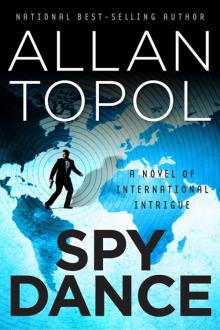 Spy Dance
Spy Dance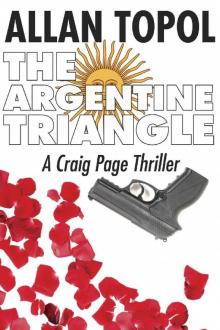 The Argentine Triangle: A Craig Page Thriller
The Argentine Triangle: A Craig Page Thriller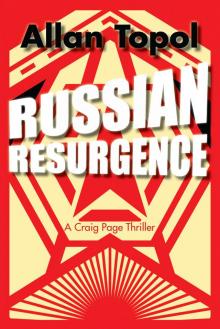 Russian Resurgence
Russian Resurgence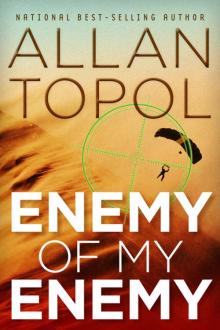 Enemy of My Enemy
Enemy of My Enemy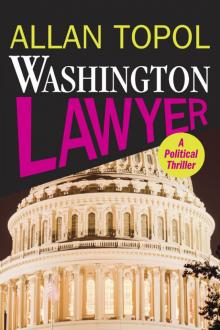 The Washington Lawyer
The Washington Lawyer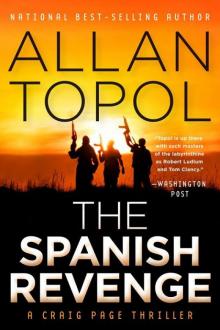 THE SPANISH REVENGE (Craig Page series)
THE SPANISH REVENGE (Craig Page series)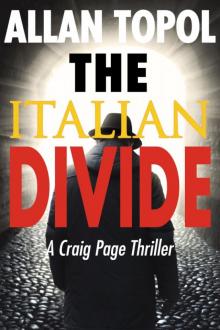 The Italian Divide
The Italian Divide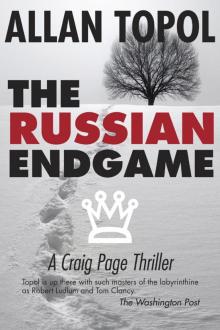 The Russian Endgame
The Russian Endgame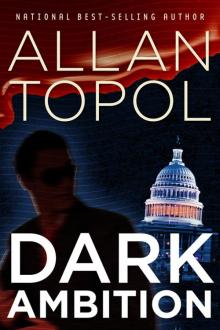 Dark Ambition
Dark Ambition